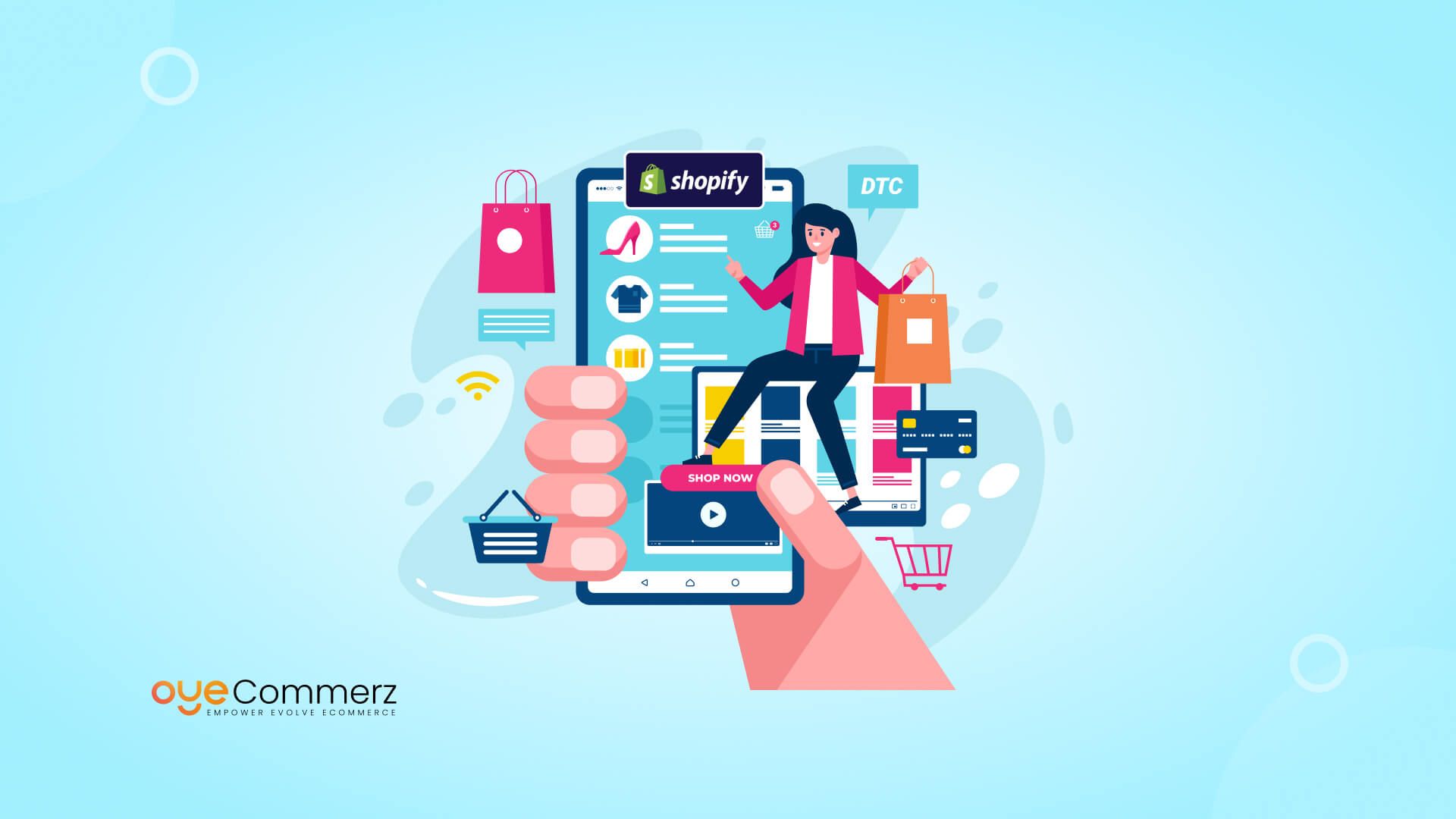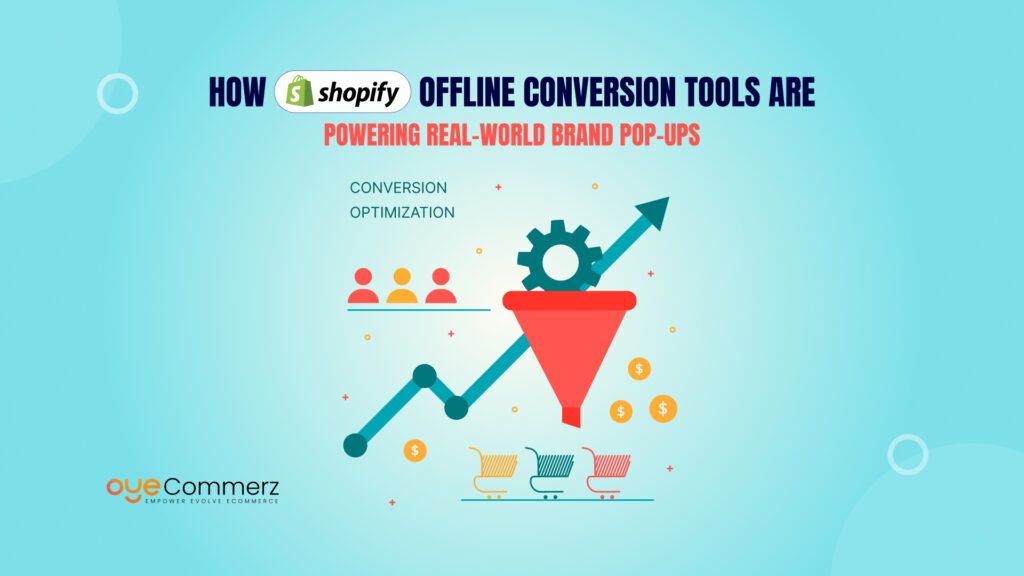The Direct-to-Consumer (DTC) business model has revolutionized eCommerce by allowing brands to sell directly to customers, bypassing traditional retail intermediaries. This shift has given businesses more control over their branding, customer experience, and pricing while fostering deeper relationships with their audience. However, as competition intensifies, DTC brands must constantly innovate to stay ahead. While Shopify provides a robust foundation for online stores, its standard features may not always align with the unique needs of every DTC business. This is where custom Shopify apps come into play, offering tailored solutions to streamline operations, enhance customer engagement, and boost conversions.
In this blog, we’ll explore why custom Shopify apps are essential for DTC brands, key features to consider, and how businesses can leverage them to build a direct-to-consumer powerhouse.
Table of Contents
ToggleWhy DTC Brands Need Custom Shopify Apps
The Direct-to-Consumer (DTC) model thrives on providing a seamless, engaging, and personalized shopping experience. While Shopify is a powerful eCommerce platform, its built-in features may not fully address the unique requirements of every DTC brand. Custom Shopify apps bridge this gap by offering tailored solutions that enhance customer experience, optimize operations, and drive revenue growth. Let’s explore the key reasons why DTC brands should invest in custom Shopify apps.
Limitations of Standard Shopify Features for DTC Brands
Although Shopify provides a solid foundation for eCommerce businesses, DTC brands often face limitations with its standard features, such as:
- Limited Personalization – Shopify’s default themes and functionalities offer customization to an extent, but they lack advanced personalization capabilities like AI-driven recommendations, dynamic pricing, or interactive quizzes to guide shoppers.
- Basic Checkout and Upselling Features – The standard Shopify checkout process is streamlined but may not include customized upsell and cross-sell options that DTC brands need to maximize average order value (AOV).
- Restricted Subscription & Loyalty Features – Many DTC brands rely on subscriptions or loyalty programs to retain customers, but Shopify’s native options are often not flexible enough for complex reward structures.
- Manual Order and Inventory Management – As a DTC business scales, managing inventory, fulfillment, and order processing manually or through Shopify’s basic tools can become inefficient.
- Limited Data & Analytics – Shopify provides essential analytics, but deeper insights into customer behavior, purchase patterns, and retention strategies require more advanced reporting and tracking capabilities.
How Custom Shopify Apps Enhance Customer Experience, Streamline Operations, and Boost Sales
Custom Shopify apps are built to solve these challenges by integrating tailored functionalities that empower DTC brands. Here’s how they make a difference:
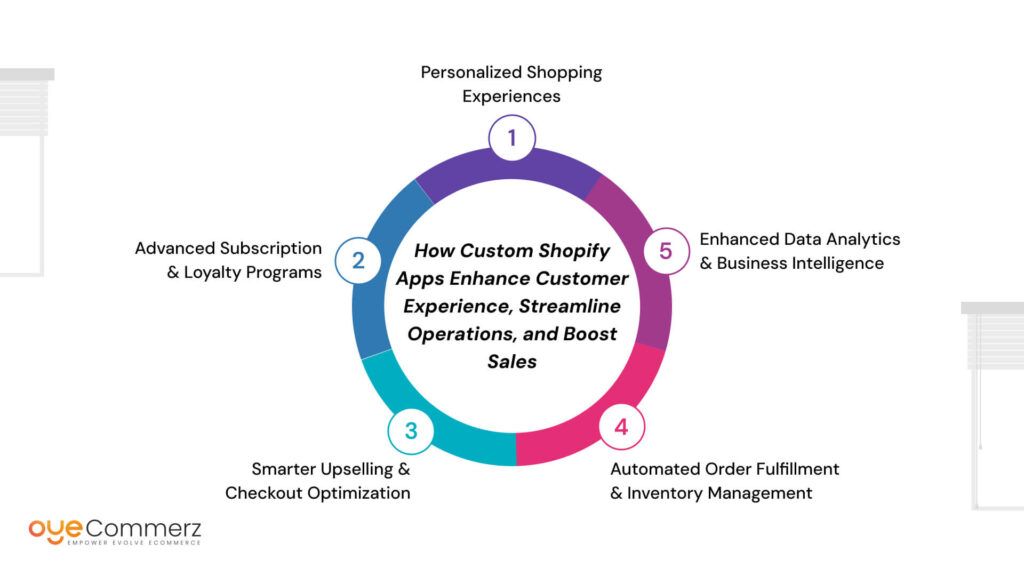
1. Personalized Shopping Experiences
A custom app can use AI-driven product recommendations, personalized quizzes, or dynamic content to offer a curated shopping experience. For example, a skincare brand could create a skin analysis quiz that suggests personalized product bundles, increasing conversions and customer satisfaction.
2. Advanced Subscription & Loyalty Programs
DTC brands with subscription-based models can develop a custom subscription management app that allows customers to pause, skip, or modify their plans effortlessly. Additionally, a custom loyalty rewards app can create unique tiers, points systems, and referral incentives tailored to the brand’s goals.
3. Smarter Upselling & Checkout Optimization
A well-designed custom upsell app can analyze customer behavior and suggest relevant products at checkout, boosting AOV. Features like one-click post-purchase upsells and cart abandonment recovery notifications can significantly increase revenue.
4. Automated Order Fulfillment & Inventory Management
Custom Shopify apps can integrate directly with warehouses, third-party logistics providers (3PLs), and inventory systems to automate stock updates, shipping processes, and order tracking. This reduces human errors and ensures timely deliveries, improving customer trust.
5. Enhanced Data Analytics & Business Intelligence
A custom analytics dashboard can provide deep insights into customer retention rates, buying patterns, and marketing performance. DTC brands can leverage this data to refine their strategies, improve targeting, and boost profitability.
Real-World Examples of DTC Brands Leveraging Custom Shopify Apps
Many successful DTC brands have turned to custom Shopify apps to enhance their operations and customer engagement. Here are a few notable examples:
- Allbirds – The sustainable footwear brand built a custom Shopify app to optimize inventory and order fulfillment across multiple warehouses, ensuring faster deliveries and reducing stockouts.
- Glossier – The beauty brand leveraged a custom app for loyalty rewards and personalized product recommendations, driving higher engagement and repeat purchases.
- Haus – A DTC aperitif brand developed a custom subscription app that allows customers to modify and personalize their drink selections before each shipment, improving retention.
- Brooklinen – The luxury bedding brand integrated a custom analytics app that provided detailed customer insights, allowing them to refine marketing campaigns and increase sales.
DTC brands need to go beyond Shopify’s standard offerings to create a unique and scalable shopping experience. Custom Shopify apps provide the flexibility and advanced functionalities necessary to personalize interactions, streamline operations, and maximize revenue. By investing in tailored solutions, DTC businesses can build a more efficient and customer-centric eCommerce powerhouse.
Key Features of Custom Shopify Apps for DTC Brands
To thrive in the competitive Direct-to-Consumer (DTC) space, brands need more than just a Shopify store they need custom Shopify apps that provide personalized shopping experiences, streamline operations, and drive customer loyalty. Below are the essential features of custom Shopify apps that empower DTC brands to build a high-performing eCommerce powerhouse.
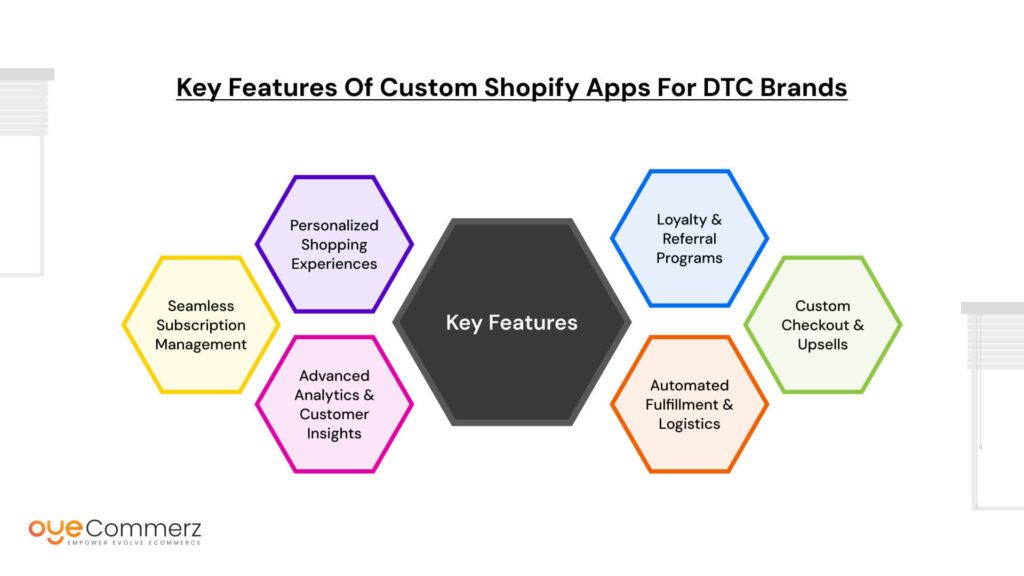
1. Personalized Shopping Experiences
Modern customers expect a shopping experience tailored to their preferences. A custom Shopify app can implement:
- AI-Powered Product Recommendations – Using machine learning algorithms, the app can analyze customer behavior, purchase history, and browsing patterns to suggest highly relevant products.
- Interactive Product Quizzes – Brands selling skincare, fashion, or supplements can integrate quizzes that guide customers to the perfect product based on their responses.
- Dynamic Content Personalization – Display personalized banners, product collections, or offers based on a user’s past interactions with the brand.
Example: A custom app for a skincare brand could provide a “Skin Type Quiz” that recommends a tailored skincare routine, increasing conversions and reducing return rates.
2. Seamless Subscription Management
DTC brands offering subscriptions need a robust system that allows customers to manage their plans effortlessly. A custom Shopify app can enhance the subscription experience with:
- Flexible Subscription Options – Allow customers to modify, pause, or skip deliveries without contacting support.
- Custom Billing & Renewal Notifications – Automated reminders and one-click renewal options to reduce churn.
- Personalized Bundling – Enable customers to mix and match subscription products based on their preferences.
Example: A coffee brand can create a subscription customization app where customers select different blends each month, keeping their experience fresh and engaging.
3. Advanced Analytics & Customer Insights
Understanding customer behavior is crucial for growth. A custom analytics app can provide:
- Customer Behavior Tracking – Track browsing history, time spent on pages, and abandoned carts to optimize marketing efforts.
- Custom Dashboards – Display real-time insights on sales trends, customer demographics, and product performance.
- Retention & Lifetime Value Metrics – Identify high-value customers and create targeted loyalty campaigns.
Example: A fashion brand using a custom analytics app could track which products are frequently abandoned in carts, allowing them to adjust pricing or offer personalized discounts to recover lost sales.
4. Loyalty & Referral Programs
Customer retention is as important as acquisition. A custom Shopify app can power a highly engaging rewards and referral system by offering:
- Point-Based Rewards – Customers earn points for purchases, reviews, and social media shares.
- VIP Memberships – Exclusive tiers that unlock premium perks like early access to new collections or free shipping.
- Referral Tracking – Automated referral links and tracking systems that reward both referrers and new customers.
Example: A sneaker brand can develop a “Sneaker Club” loyalty app where customers earn points for purchases and social engagement, redeemable for discounts or exclusive drops.
5. Automated Fulfillment & Logistics
Scaling a DTC brand requires seamless logistics. A custom Shopify app can automate fulfillment and inventory management by integrating with:
- Third-Party Logistics (3PL) Providers – Direct integration with shipping partners for real-time tracking and order status updates.
- Smart Inventory Sync – Automatic stock level adjustments to prevent overselling or stockouts.
- Order Processing Automation – Streamlining warehouse operations with barcode scanning and batch processing.
Example: A supplement brand with multiple fulfillment centers can use a custom inventory management app to automatically route orders to the nearest warehouse, reducing shipping costs and delivery time.
6. Custom Checkout & Upsells
Checkout is where conversions happen, and a custom Shopify app can maximize order value with:
- One-Click Upsells & Cross-Sells – Recommend complementary products at checkout or post-purchase.
- Custom Payment Methods – Support for BNPL (Buy Now, Pay Later) services, cryptocurrency, or localized payment options.
- Cart Abandonment Recovery – Automated discounts or reminder emails for users who leave items in their carts.
Example: A beauty brand could implement a post-purchase upsell app offering a limited-time discount on related products immediately after checkout, increasing average order value (AOV).
Custom Shopify apps enable DTC brands to offer unique, high-converting shopping experiences that go beyond Shopify’s built-in features. Whether it’s personalization, subscriptions, analytics, loyalty programs, fulfillment automation, or checkout optimization, a tailored app can streamline operations, drive customer engagement, and boost sales.
Steps to Building a Custom Shopify App for Your DTC Brand
Building a custom Shopify app tailored to your Direct-to-Consumer (DTC) brand’s needs can significantly enhance customer experience, automate operations, and boost sales. However, developing a successful app requires a strategic approach. Here’s a step-by-step guide to help you build a powerful and efficient custom Shopify app for your brand.
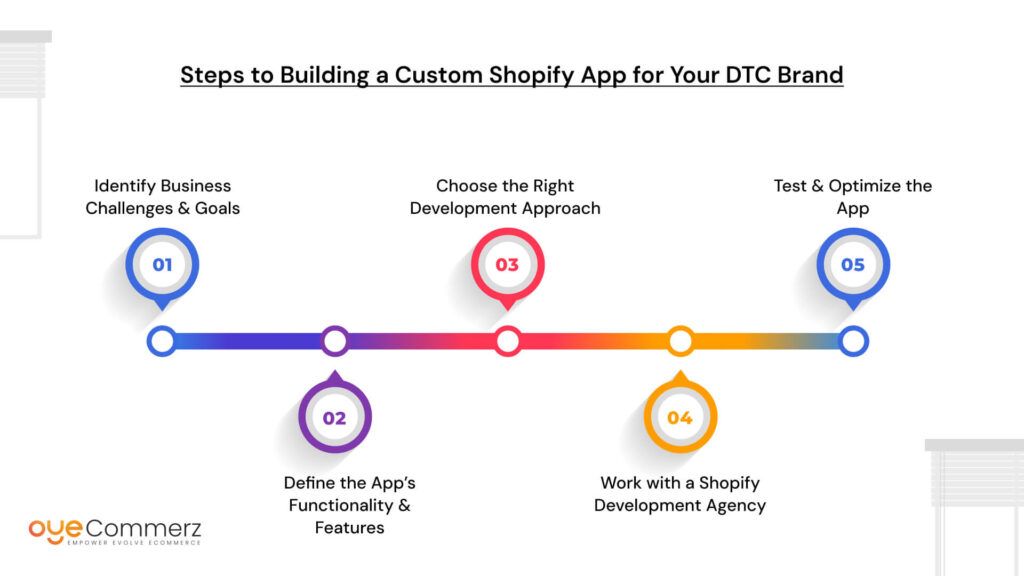
Step 1: Identify Business Challenges & Goals
Before diving into app development, it’s crucial to define the problems your business is facing and the goals you want to achieve. Ask yourself:
- What pain points are slowing down operations?
- Are there gaps in customer experience that a custom app could fill?
- How will the app support business growth and scalability?
Examples of Business Challenges
- High cart abandonment rates, requiring a personalized checkout experience and one-click upsells.
- Inefficient inventory management, leading to the need for automated stock syncing and warehouse integration.
- Poor customer retention, making a loyalty and rewards program essential.
- Limited subscription flexibility, necessitating an app for custom subscription management.
By clearly defining the problem areas, you can ensure that the app is built with a purpose-driven approach rather than adding unnecessary features.
Step 2: Define the App’s Functionality & Features
Once you identify your challenges, outline what features the app must include to solve them. The more specific you are, the better the development process will be.
Key Functionalities to Consider
- Personalized Shopping Experiences – AI-driven recommendations, interactive quizzes, and dynamic pricing.
- Subscription Management – Options for customers to pause, skip, or modify their subscriptions.
- Loyalty & Referral Systems – Custom rewards, VIP tiers, and automated referral tracking.
- Advanced Analytics – Real-time customer insights, sales trends, and behavior tracking.
- Automated Order Processing – Warehouse integration, multi-location fulfillment, and shipment tracking.
- Custom Checkout & Upsells – One-click upsells, post-purchase offers, and abandoned cart recovery tools.
Clearly defining these functionalities ensures the app is aligned with your brand’s business model and customer expectations.
Step 3: Choose the Right Development Approach
Shopify apps can be built as private apps or public apps, and choosing the right approach depends on your goals.
Private Shopify Apps
- Built specifically for your store and not available on the Shopify App Store.
- Ideal for internal business processes, unique checkout experiences, or advanced integrations.
- More control and customization, but requires direct maintenance.
Public Shopify Apps
- Listed on the Shopify App Store and available to other merchants.
- Best if you want to monetize your app and make it available to a larger audience.
- Requires Shopify’s approval process and ongoing updates to meet Shopify’s standards.
If the app is meant only for your business operations, a private app is the best choice. If you see an opportunity to sell the solution to other merchants, a public app could be the better route.
Step 4: Work with a Shopify Development Agency
While some businesses may have an in-house development team, working with an experienced Shopify development agency can help bring your vision to life more efficiently.
Benefits of Working with a Shopify Development Agency
- Expertise in Shopify’s API and ecosystem ensures smooth integrations with existing tools.
- Faster development timelines compared to building an in-house team from scratch.
- Ongoing support and maintenance to ensure the app remains functional as Shopify updates its platform.
- Custom UX/UI design to create an intuitive and seamless experience for both store owners and customers.
Choosing the right agency can save time, reduce errors, and ensure the app is built for long-term success.
Step 5: Test & Optimize the App
Before launching, the app must go through rigorous testing to ensure it works as intended.
Testing Process
- Functional Testing – Ensuring all features work without errors.
- User Testing – Gathering feedback from real users to improve usability.
- Performance Testing – Checking load times and responsiveness.
- Security Testing – Ensuring customer data and payment information is protected.
After testing, continue optimizing the app based on user feedback. Shopify’s ecosystem is constantly evolving, and a successful app should adapt to customer needs and new platform updates.
Developing a custom Shopify app for a DTC brand requires careful planning, the right development approach, and continuous optimization. By identifying your business challenges, defining key functionalities, selecting the best development approach, and working with experts, you can build an app that enhances customer experience, streamlines operations, and drives revenue growth.
How Oyecommerz Helps DTC Brands Build Custom Shopify Apps
Oyecommerz is a leading Shopify development agency specializing in custom app solutions for Direct-to-Consumer (DTC) brands. With expertise in Shopify’s API, automation, and third-party integrations, we help brands create tailored apps that enhance customer experience, optimize operations, and drive growth.
Our Approach to Custom Shopify Apps
- Strategy-Driven Development: We start by understanding your business goals and challenges to build an app that delivers real value.
- Seamless Integration: Our apps integrate smoothly with Shopify and third-party tools, ensuring a hassle-free experience.
- Scalable Solutions: We build apps that grow with your brand, whether you need advanced analytics, personalized shopping, or automation.
Why Choose Oyecommerz?
- Shopify Experts: Deep understanding of Shopify’s ecosystem and custom app capabilities.
- Tailored Solutions: Every app is designed to meet your brand’s specific needs.
- Ongoing Support: From development to post-launch maintenance, we ensure long-term success.
Ready to scale your DTC brand with a custom Shopify app? Contact Oyecommerz today and transform your Shopify store into a high-performing powerhouse.
Contact to Migrate your Site to Shopify NowSupercharge Your Business with Oyecommerz
Conclusion
Custom Shopify apps are a Beneficial for Direct-to-Consumer (DTC) brands, providing tailored solutions that enhance customer experience, automate operations, and drive revenue. From personalized shopping experiences to seamless fulfillment and loyalty programs, a well-built custom app can give your brand a significant competitive edge.
Investing in Shopify app development is not just about solving immediate challenges, it’s about building a scalable, future-proof eCommerce business. With the right custom solutions, DTC brands can unlock new growth opportunities, streamline workflows, and create a loyal customer base.
If you’re ready to take your Shopify store to the next level, now is the time to invest in a custom app designed for your brand’s success.

